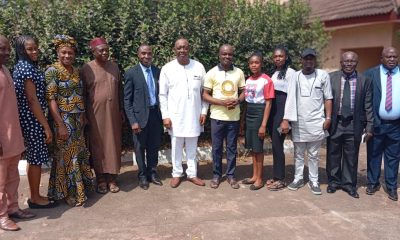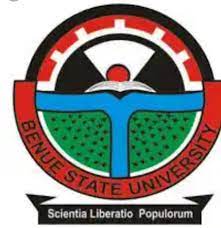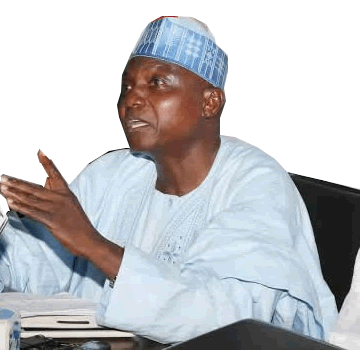POLITICS
Why I Object to State Police – Senator Udende
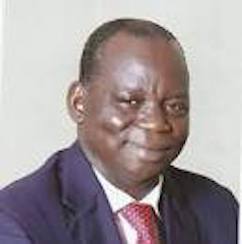
By Eze Okechukwu, Abuja
The Senator representing Benue North East at the National Assembly, Senator Udende Memsa Emmanuel has explained that the crazy mentality of some Nigerian politicians, especially the Governors remained the reason he is opposed to the creation of state police.
Speaking with newsmen in his office at the National Assembly yesterday, Senator Udende who was the Deputy House Committee Chairman on Police Affairs during the previous dispensation pointed out that the mentality of most political elites in Nigeria was low, so if they had state police they would use it to harass and intimidate political opponents.
The Senator, a lawyer by profession however said that community policing, where youths from various communities get the opportunity in equal measures to join the federal police and be posted in their respective localities remained the best policing option for Nigeria at the moment.
Recall that senator Udende had earlier in the day moved a motion seeking the Police Service Commission and the Nigeria Police Force to adhere to the Federal Character Principle in the recruitment of Constables into the Nigeria Police Force, stressing that both entities should ensure the recruitment of at least 10 personnel from each of the 774 Local Government Areas in Nigeria.
He said such a measure would entrench unity, harmony and the spirit of community policing rather than bickering and suspicion which had become the order of the day after each police recruitment exercise across the country.
He noted that the underlying philosophy of the federal character principle was to provide equality of access in public service representation to curb dominance by one or few sections of the country either in the federal, state or local government, saying otherwise it would create lopsidedness.
“I will, in the interim, oppose the creation of State Police. As you know, most of our political leaders, especially those Governors are crazy, they have mad attitudes to issues and low comprehension ability to the principles of fair play. They will abuse the good intentions of the spirit of State Police, use it to harass and intimidate not just their political opponents but anyone who goes against their thoughts and aspirations.
“In place of State Police, I’m for Community policing under the supervision and control of the federal government. This is the best approach for now in my opinion. To this effect, I moved a motion on the floor of the Senate earlier urging the Police Service Commission and the Nigeria Police Force to recruit at least 10 persons from each local government area in Nigeria in the spirit of the federal character principle. Such personnel could be posted within the local government areas and that’s community policing pure and clear. If they do that for 10 years, would we still be talking about State Police?, he queried.
However, his motion was supported by the Senate Minority leader, Abba Moro of Benue South senatorial district, senator Titus Zam of Benue North West and senator Bassey Ekong of Cross River North, making the deputy senate president, Jibrin Barau who presided over the plenary yesterday adopt the motion and consequently directing the Committee on Police Affairs and legislative compliance to ensure compliance as well as directing the police authorities to recruit at least 10 persons each across the 774 local government areas of Nigeria.
POLITICS
2025 budget: LP Chieftain Lauds Tinubu for Diving Priority to Security, Others
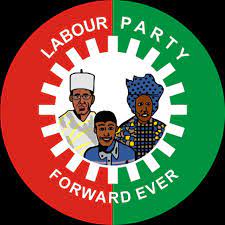
Dr Ayo Olorunfemi, National Deputy Chairman of the Labour Party (LP) ,has commended President Bola Tinubu for giving priority to security and other key sectors in the 2025 Appropriation Bill .
Olorunfemi gave the commendation while speaking with newsmeon Thursday in Lagos.
NAN reports that the President had on Wednesday presented the N47.
9 trillion 2025 Appropriation Bill , christened “Budget of Restoration, Securing Peace and Rebuilding Prosperity” , to a joint session of the National Assembly .The President listed highlights of the 2025 budget allocations to include: defense and security: N4.91 trillion; infrastructure: N4.06 trillion; Health: N2.
48 trillion and Education: N3.52 trillion.Reacting , Olorunfemi described security as an enabler of development.
He called on the President to ensure proper implementation ,saying budgets had always been well-crafted but usually lacked monitoring and implementation.
“There is nothing that can happen if there is no security. This is good if the budget is properly utilised for the purpose.
“Our problem is not about policies and budgets, it is about monitoring and implementation.
“There is nothing wrong in bringing a budget proposal forward in terms of expectation, what we want to do, how we want to do it, and how much we want to spend.
“Now, the most important thing is the implementation,, budgets in Nigeria have always been properly crafted,” the LP boss said.
Olorunfemi called on the President to build strong institutions to prevent sabotaging of his policies.
“If this government wants to do anything, it must wake up to the responsibility of monitoring policies and ensure severe penalty for anyone who attempts to sabotage such policies.
“We need institutions that no one will be able to interfere with. We must allow these institutions to work, that is what we expect.
“Once we have strong institutions, most of our problems are solved,” he said.
He also called on the President to take steps to address the problems experienced by Nigerians in the banking sector.
Olorunfemi decried the inability of many Nigerians to get cash at bank’s Automated Teller Machines and the high charges paid to get cash from Point of Sales (POS) operators.
The LP boss also urged the President to devise ways of ending multiple taxations and high fuel price, describing them as major causes of hardship .
Recalled that the President said that the budget was a demonstration of government’s commitment to stabilising the economy, improving lives and repositioning the country for greater performance.
He also said the budget sought to consolidate the key policies instituted to restructure the economy, boost human capital development, increase the volume of trade and investments and bolster oil and gas production. (NAN)
POLITICS
Atiku hails Ndimi’s Oriental Energy on commissioning of first FPSO
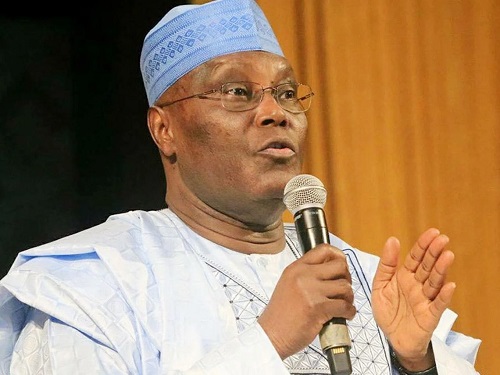
By Mike Odiakose, Abuja
The former Vice President of Nigeria and PDP Presidential flag bearer in the 2023 general elections, Atiku Abubakar has congratulated the Chairman of the Nigerian Independent producer, Oriental Energy Resources (OER), Muhammadu Indimi, on the successful completion and commissioning of the Okwok Field’s Floating Production Storage and Offloading (FPSO) vessel/platform in Dubai.
In a statement in Abuja by his Media Office in Abuja on Wednesday, the Former Vice President described the commissioning of the FPSO as one of the most gladdening news coming out from the upstream subsector of Nigeria’s oil industry in recent times.
“The vessel’s deployment at the Okwok field is expected to significantly increase Nigeria’s crude oil output, contributing to the government’s revenue growth and economic development objectives,” he said.
According to Atiku, “This is the first FPSO entirely funded by an indigenous Nigerian company and this landmark achievement being championed by OER showcases the rising capability of Nigerian firms in conceptualising and successfully executing complex projects in the nation’s upstream oil industry.
The successful building and commissioning of the FPSO marks a significant step toward enabling an indigenous oil and gas company to independently develop a marginal oil field.
This development marks an important milestone for Nigeria and its indigenous energy sector, he said.
“No doubt, this latest investment would boost economic growth, generate job opportunities for Nigerians, and ensure steady growth and development of not only the oil sector but the nation’s economy in general.”
He described Indimi as a man who so much believes in the capabilities that exist in the Nigerian oil and gas industry.
“From onset of his foray into the nation’s oil sector, his vision of standing out as a player of reckon in the nation’s upstream oil business has been top-notch,” he said.
As he said, Oriental Energy’s significant investment in the oil sector has set a new standard in local investment and operational excellence in the nation’s oil business, benefiting both the company and its partners.
The 40,000 barrels per day capacity facility constructed by the Singaporean firm HBA Future Energy will commence sailing to Nigerian waters beginning February 2025 for hook-up on the Okwok Oil Field. Production is expected to commence on the oil field in the first half of next year.
Okwok Oil Field, discovered by ExxonMobil in 1967, is located in Oil Mining Lease(OML) 67, in 31 metres water depth in shallow marine, southeast offshore Nigeria with estimated recoverable reserves of 45 million barrels. OER has an ongoing multi-well drilling campaign on the field that commenced in October 2023.
POLITICS
2025 Budget: Consequences Will be Devastating, says CUPP

By Mike Odiakose, Abuja
The Coalition of United Political Parties (CUPP) on Wednesday said the consequences of the 2025 budget proposal presented to the National Assembly by President Bola Tinubu will be “far-reaching and devastating.”
According to the CUPP, the budget proposal is a stark reminder of the country’s persistent fiscal woes.
President Tinubu Tuesday presented a national budget of N47.
96 trillion for 2025 to the joint session of lawmakers in the National Assembly.He said the budget which was put together based on economic realities and would trigger the prosperity of Nigerians in 2025 if implemented to the latter, adding that it would restore and consolidate key polices of government.
Tinubu said Nigerians have shown resilience in 2024 economic challenges, hence, he believed that the 2025 budget would leverage that so that the fabric of the nation can be built further in 2025.
However, in a statement signed by High Chief Peter Ameh, the Publicity Secretary of CUPP, said a cursory examination of the line items reveals a familiar pattern which includes, debt servicing continues to take a substantial chunk of the budget, while allocations for critical sectors such as healthcare, education, and infrastructure remain woefully inadequate.
“This phenomenon is not new; rather, it is a recurring tale that has plagued Nigeria’s budgeting process for years,” the statement added.
“The implications of this trend are far-reaching and devastating. As debt servicing continues to drain the country’s resources, poverty levels have skyrocketed, and economic growth has stagnated.
“The human cost of this mismanagement is evident in the lack of access to basic necessities such as healthcare, education, and clean water.
“The failure to address these pressing needs has led to widespread disillusionment and frustration among Nigerians.
“The President’s budget proposal for 2025 presents an opportunity for a paradigm shift. By prioritizing investments in critical sectors, the government can create jobs, stimulate economic growth, and reduce poverty. However, this requires a fundamental transformation of the budgeting process, one that prioritizes transparency, accountability, and stakeholder engagement.
“To break the cycle of annual rituals, the government must adopt a more proactive and responsive approach to budgeting. This includes involving civil society, the private sector, and citizens in the budgeting process to ensure that allocations reflect the country’s pressing needs.
“Performance-based budgeting, where funds are allocated based on performance indicators and project outcomes, can also help to ensure that resources are utilized efficiently.
“Furthermore, the government must address the issue of debt servicing, which continues to drain the country’s resources. Debt restructuring, revenue enhancement, and budget realignment are potential strategies that can help to alleviate this burden.
“The 2025 budget proposal presents a critical juncture for Nigeria. Will the government continue down the path of debt servicing and neglect, or will it seize the opportunity to transform the budgeting process and prioritize the needs of its citizens?
“The choice is clear, and the consequences of inaction will be dire. It is time for a new approach, one that prioritizes transparency, accountability, and the well-being of all Nigerians.”







